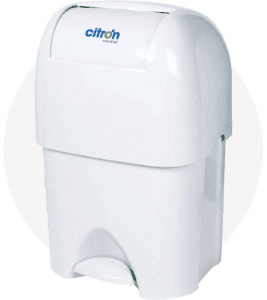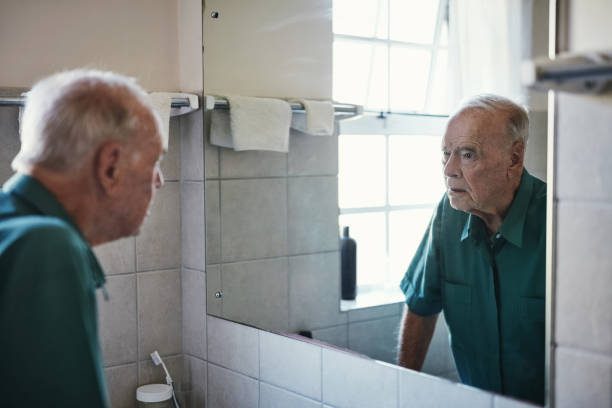Table of Contents
Updated on June 13, 2023
According to a report by the Centre for Disease Control (CDC), more than 50% of older Americans struggle with incontinence.
But it’s not just a problem related to the elderly. Although incontinence increases as we age, research for Aeroflow shows that over 62% of adult women ages 20 and older and 15.1% of men ages 20 and older experience urinary incontinence.
For many adults who struggle with incontinence, the disposal of adult diapers can be an embarrassing and stressful experience.
The odor and mess associated with throwing soiled diapers in a normal trash can could be an embarrassing and stressful experience, as well as leave an odour that makes for an unpleasant environment for everyone who uses the washroom.
In addition, the negative environmental impact of disposable diapers is a growing concern. They can take hundreds of years to break down and contribute to ever-growing landfills.
But while incontinence is not an enjoyable experience to deal with, thankfully, there are new discreet, and sustainable solutions available that can make the experience of disposal a little more dignified.
In this article, we’ll explore how businesses can improve the overall cleanliness of their washrooms while providing more comfortable, dignified, and confident experiences for those struggling with incontinence.
We’ll also look at how environmentally friendly solutions can help reduce waste and contribute to a more sustainable future.
So let’s dive in and break the taboo surrounding adult diaper disposal.
ALSO READ: Dealing with Incontinence at Work: 5 Accommodations Your Employer Should Make
How Many Adults in North America Use Adult Diapers?
The truth is, incontinence is more common than you may think. According to the National Association for Incontinence, over 25 million adults in North America are affected by some form of urinary incontinence.
That’s a lot of people who have to endure unpleasant bathroom experiences in public washrooms and need discreet and hygienic solutions for disposing of their adult diapers.
Furthermore, urinary and fecal incontinence can take a serious economic toll on employers. Researchers published in Gastroenterology that those who experience the gastrointestinal symptoms that come with incontinence reported missing an average of 50 days from work or school in the past year compared to 4.9 days for those without symptoms.
Trash Can vs. Adult Diaper Disposal Solutions
When it comes to disposing of adult diapers, if you’ve never had to do it, you probably think throwing them in the trash is an easy solution.
However, throwing adult diapers and pads in the regular garbage can lead to a whole host of issues. First and foremost, the smell of dirty diapers can be overwhelming. A regular plastic trash bag does not mask the smell of urine and the strong odor that can then linger in the air. This can make using the washroom uncomfortable for other employees or customers.
Additionally, disposing of adult diapers in a regular trash can could lead to cross-contamination and the spread of germs. If the diaper is not wrapped properly, the contents can spill out and come into contact with other items in the trash can. This can create a breeding ground for bacteria and can lead to the spread of illness.
There’s a reason why different types of waste come with different disposal protocols to ensure the safety of the cleaning and janitorial staff who are responsible for waste removal. However, when waste is mixed into the wrong bin without the proper infection prevention measures, employees and other washroom users become at risk for cross-contamination and the resulting bacteria that can lead to infection.


The Stress of Wearing an Adult Diaper
But the main people who suffer from poor disposal options of adult diapers are their users, not the people who come into the bathroom after them.
Wearing an adult diaper can be a stressful and embarrassing experience, especially in a public setting. Many people feel ashamed or uncomfortable with the idea of needing to wear a diaper, which can lead to feelings of isolation and depression. This can be especially difficult for older adults who may already be struggling with a loss of independence or mobility.
For many adults who rely on diapers, the stigma and shame surrounding incontinence can be overwhelming, especially in public settings like the workplace,restaurants, and shopping centers. Providing a private and hygienic solution for disposing of adult diapers can help alleviate some of this stress and anxiety and provide a more dignified experience for those who struggle with incontinence.
This is particularly important in the workplace, where employees who use adult diapers may feel embarrassed or ashamed of their condition. This embarrassment can make your employees or customers uncomfortable asking for the facilities they need.
Rather than coming to you and saying that they want a bin for their adult diapers (Meaning they have to admit to wearing them – a personal private detail they probably don’t want to share), they simply struggle with trying to dispose of their adult diapers in trash cans.
By providing discreet and hygienic solutions for adult diaper disposal, you can create a more inclusive and supportive work environment where all your employees feel valued and respected.
Similarly, public places like shopping centers and restaurants can benefit from providing discreet solutions for adult diaper disposal. By making washrooms more welcoming and accommodating for those who use adult diapers, you can create a more inclusive and welcoming environment for all customers.
The Negative Impact on the Environment
We can’t breach the topic of adult diaper disposal without discussing the negative impact that adult diapers can have on the environment. According to research about the Advances in Technical Nonwovens, disposable diapers are the third largest single consumer item in landfills and represent about 4% of solid waste. This is a concerning statistic, considering that disposable diapers can take hundreds of years to break down in a landfill.
By providing an efficient and hygienic solution for disposing of adult diapers, businesses can help reduce their environmental impact and contribute to a more sustainable future.
By providing incontinence waste bins in your bathrooms, you can ensure that this waste is separated from the rest of your trash. It can then more easily be disposed of in the correct way and reduce the amount of waste that ends up in landfills.
This might sound like it won’t have a major impact. But we have to be positive in our outlook for the future. The way that we dispose of adult diapers is changing, and new projects are emerging to try to lessen the environmental impact they make. For example, one town in Japan is using disposable adult diapers being recycled to treat soil, and grow cotton. But these kinds of initiatives can only take place when they are properly separated from the trash that goes to landfills.
Conclusion – Revolutionizing Adult Diaper Disposal
Providing discreet and hygienic solutions for adult diaper disposal is an important consideration for businesses.
By using solutions like Citron Hygiene’s Incontinence Waste Bins, your business can improve the overall cleanliness and odour of your washrooms while also providing a more comfortable and dignified experience for your employees and customers who may be struggling with incontinence.
FAQs – Incontinence Care
Can incontinence pads go into general waste?
No. Adult diapers and incontinence pads should not go into general waste as standard garbage cans do not contain the odour and infection prevention measures that incontinence care units do.
What is the best way to dispose of incontinence pads?
Incontinence pads and adult diapers are best disposed of in a touch-free incontinence care unit designed to reduce cross-infection and foul odors while ensuring that those with incontinence issues feel cared for and supported.
What happens when you flush a diaper down the toilet?
Diapers are designed to absorb large amounts of fluid and will expand in doing so. When a diaper is flushed down the toilet, it will become too big to go through the pipes and will cause a blocked and clogged toilet.
Related posts:
- How to Dispose of Adult Diapers And Pads – The Right Way
- Urinary Incontinence in the Workplace: 5 Essential Steps For Employers
- Why Elevate Your Washroom Experience (work)
- Ensuring Workplace Safety: Key Strategies for Business Preparedness
- Summertime Maintainence – Best Time For Washroom Upgrade
- The Benefits of Citron Complete
- Dirty Diapers: Get the Smell Out of Your Restroom
